Top 10 Government Interest Free Loans for Startup Business In UK
Starting a business can be one of the most exhilarating experiences, but it also comes with its fair share of financial challenges. As a budding entrepreneur in the UK, securing funding without incurring high-interest costs can be a game-changer. This is where government interest-free loans come into play.
These loans are designed to provide startups with the necessary capital to kickstart their operations without the burden of interest, making it easier to focus on growth and innovation. In this guide, I’ll walk you through the top 10 government interest-free loans available for startups in the UK, helping you navigate your options and choose the best fit for your business.
What Are Government Interest-Free Loans?
Understanding the Concept
Government interest-free loans are financial products provided by the government or government-backed institutions aimed at supporting startups and small businesses. Unlike traditional loans, these do not accrue interest over time, meaning you only pay back the principal amount. This can significantly ease the financial pressure on new businesses, allowing them to allocate more resources towards growth and development.
Benefits for Startups
The main advantage of interest-free loans is the reduced financial strain on your business. Without the need to pay interest, you can repay the loan faster, improving your cash flow. Moreover, these loans often come with additional support such as mentoring, which can be invaluable during the early stages of your business journey.
Top 10 Government Interest-Free Loans for UK Startups
1. Start Up Loans Scheme
Features:
- Loan Amount: Up to £25,000 per individual; businesses with multiple partners can apply for up to £100,000.
- Interest Rate: 6% fixed annual interest rate.
- Repayment Terms: Flexible repayment period between 1 to 5 years.
- Support: Includes 12 months of free mentoring and support services.
Application Process:
- Initial Eligibility Check: Complete an online application to check your eligibility.
- Business Plan Submission: Submit a detailed business plan and cash flow forecast.
- Application Review: Your application is reviewed by a lending partner.
- Approval and Disbursement: If approved, the funds are disbursed, and mentoring services begin.
Limitations:
- Eligibility Restrictions: Only available to UK residents who have started or plan to start a UK-based business.
- Credit Check: A personal credit check is required, which could affect your credit score.
Pros:
- Access to free mentoring.
- Flexible loan terms.
- Quick disbursement of funds.
Cons:
- 6% interest, while low, is still a cost compared to purely interest-free loans.
- Strict application process with detailed documentation requirements.

2. Prince’s Trust Enterprise Programme
Features:
- Loan Amount: Up to £5,000.
- Target Audience: Young people aged 18-30 who are unemployed or working fewer than 16 hours a week.
- Support: Includes mentoring, training workshops, and one-on-one guidance.
Application Process:
- Initial Contact: Attend an information session or contact the Prince’s Trust directly.
- Workshops: Participate in a free, four-day workshop to learn business essentials.
- Business Plan Development: Work with a mentor to develop a business plan.
- Loan Application: Submit your business plan and apply for the loan.
- Approval: After approval, receive funds and ongoing support.
Limitations:
- Age Restriction: Only available to individuals aged 18-30.
- Loan Cap: Relatively low maximum loan amount.
Pros:
- Comprehensive support beyond just financing.
- Tailored to young entrepreneurs, providing a strong foundation.
Cons:
- Loan amounts are limited, which may not be sufficient for all startups.
- Focuses on unemployed or underemployed individuals, excluding those with full-time jobs.
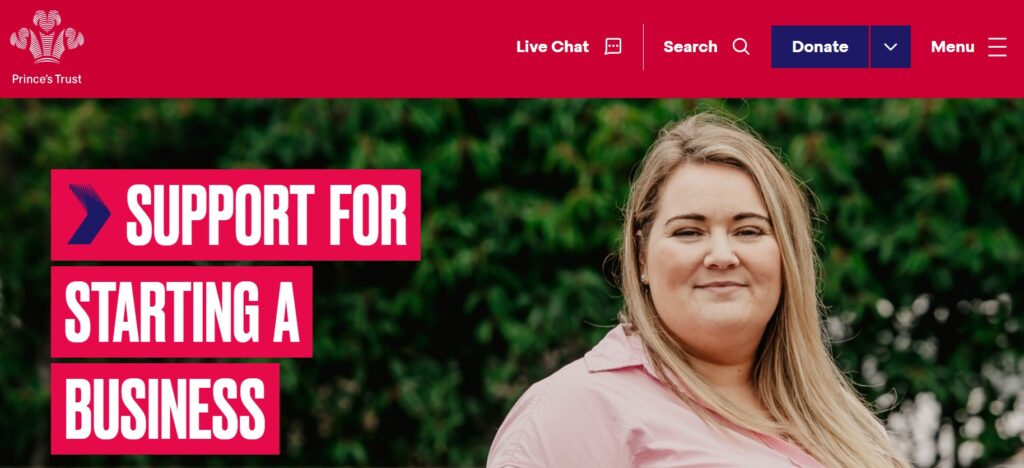
3. British Business Bank
Features:
- Loan Amount: Varies depending on the specific program.
- Purpose: Aims to increase the supply of finance to smaller businesses in the UK.
- Support: Offers a range of financial products, including loan guarantees and equity finance.
Application Process:
- Identify Suitable Program: Review the various funding options available through the British Business Bank.
- Partner Lender Application: Apply directly through a British Business Bank partner lender or investment provider.
- Approval Process: The application is reviewed by the lender, who then decides on the loan.
Limitations:
- Complex Application Process: The variety of programs can make it difficult to determine the best option.
- Eligibility Criteria: Some programs are only available to businesses with high growth potential.
Pros:
- Wide range of financial products.
- Support for businesses in various stages of growth.
Cons:
- Not all programs are interest-free.
- Requires a strong business case for approval, particularly for larger loans.

4. Innovate UK Smart Grants
Features:
- Funding Amount: Grants of up to £2 million, which can include loan elements for project costs.
- Focus: Supports innovation-driven projects in science and technology.
- Support: Includes access to Innovate UK’s extensive network of experts and advisors.
Application Process:
- Competition Entry: Submit an application during one of the regular funding competitions.
- Project Proposal: Provide a detailed project proposal outlining innovation, feasibility, and potential impact.
- Assessment: Innovate UK assesses applications based on merit and project potential.
- Funding Awarded: If successful, funding is provided in stages based on project milestones.
Limitations:
- Highly Competitive: The application process is rigorous and highly competitive.
- Sector Specific: Focuses on specific sectors like technology, healthcare, and environmental projects.
Pros:
- Significant funding available for innovative projects.
- Grants reduce the need for repayment, easing financial pressure.
Cons:
- Application process can be complex and time-consuming.
- High competition reduces the likelihood of securing funds.
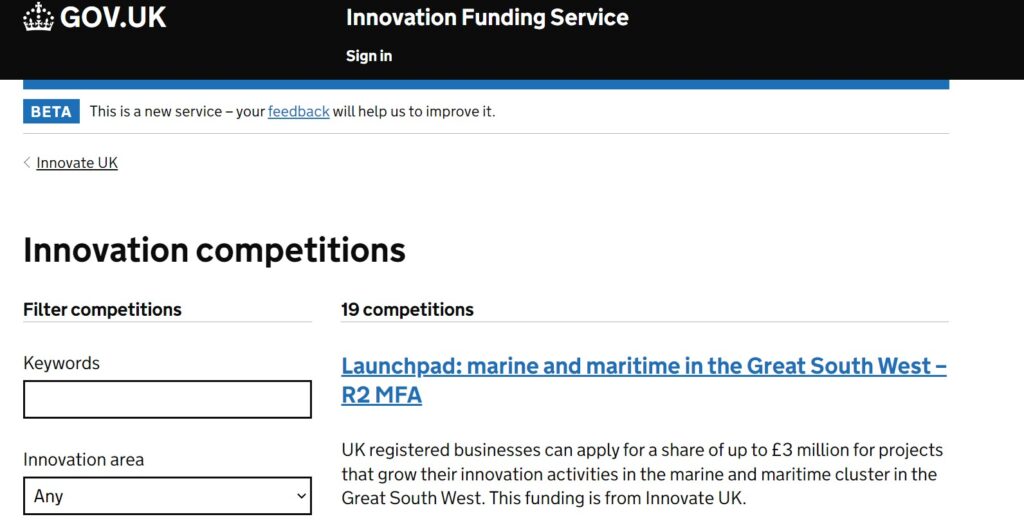
5. Regional Growth Fund (RGF)
Features:
- Loan Amount: Varies by region and project.
- Purpose: Supports business growth in economically disadvantaged regions of the UK.
- Support: Typically includes both financial and advisory support tailored to the region.
Application Process:
- Regional Application: Apply through the regional authority managing the fund.
- Project Proposal: Submit a detailed proposal explaining how the project will contribute to regional growth.
- Approval: The regional authority reviews the application and decides on funding.
Limitations:
- Regional Focus: Only available to businesses in specific regions.
- Limited Availability: Funding is subject to availability and regional priorities.
Pros:
- Encourages regional economic development.
- Flexible funding options depending on regional needs.
Cons:
- Limited to certain geographic areas.
- Not all regions have active funding rounds, limiting availability.
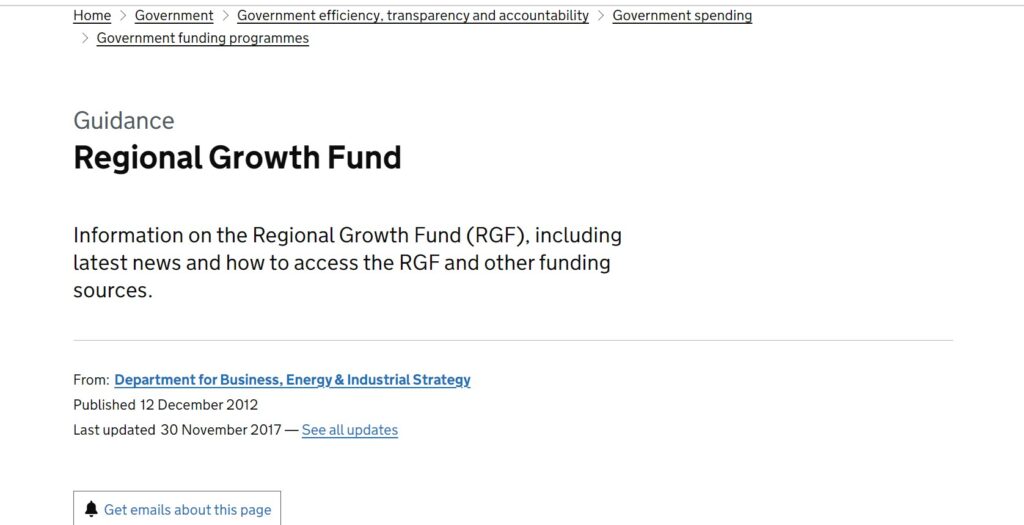
6. National Lottery Heritage Fund
Features:
- Loan Amount: Varies depending on the project.
- Focus: Supports heritage projects that preserve and promote cultural heritage.
- Support: Offers both grants and interest-free loans, along with guidance from heritage experts.
Application Process:
- Initial Discussion: Contact the National Lottery Heritage Fund to discuss your project.
- Application Submission: Submit a detailed application outlining the project’s cultural significance and impact.
- Assessment: The fund assesses the application based on heritage value, sustainability, and public benefit.
- Funding Awarded: If successful, funds are disbursed in stages based on project progress.
Limitations:
- Project Specific: Only available for projects with a clear heritage focus.
- Competitive: Applications are reviewed on merit, with strong competition.
Pros:
- Supports culturally significant projects.
- Provides flexible, interest-free loans with additional expert guidance.
Cons:
- Limited to heritage-related projects, excluding other sectors.
- Application process can be lengthy and complex.
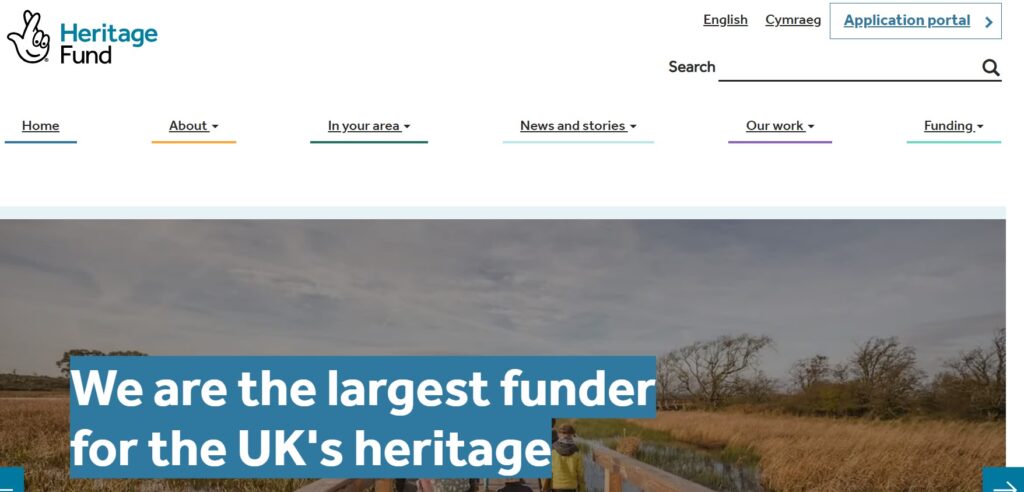
7. UK Export Finance (UKEF)
Features:
- Loan Amount: Varies based on export needs.
- Purpose: Supports UK businesses in exporting goods and services.
- Support: Provides interest-free loans, guarantees, and insurance to facilitate international trade.
Application Process:
- Initial Consultation: Contact UKEF to discuss your export needs.
- Loan Application: Submit an application outlining your export strategy and financial needs.
- Approval and Disbursement: UKEF reviews the application and, if approved, provides the necessary funds or guarantees.
Limitations:
- Export Focused: Only available to businesses involved in exporting.
- Detailed Documentation: Requires thorough documentation of export activities and financial health.
Pros:
- Helps UK businesses enter and expand in international markets.
- Provides a range of financial products tailored to exporters.
Cons:
- Limited to export activities, excluding businesses focused on domestic markets.
- Detailed application process with stringent requirements.

8. The Seed Enterprise Investment Scheme (SEIS)
Features:
- Investment Amount: Up to £150,000 in funding.
- Focus: Provides tax relief to investors in exchange for equity, with potential interest-free loan elements.
- Support: Attracts investment for startups, making it easier to raise capital.
Application Process:
- Prepare Your Business for Investment: Ensure your business meets SEIS criteria, including being a new company with limited trading history.
- Investor Engagement: Engage with investors who are eligible for SEIS tax relief.
- Funding and Equity Exchange: Secure investment in exchange for equity in your company, with potential for interest-free loan elements.
Limitations:
- Equity Requirement: Involves giving up equity in your business.
- Eligibility Criteria: Strict eligibility requirements, including a maximum age and size of the company.
Pros:
- Attracts investment with significant tax benefits for investors.
- Can provide a mix of equity and loan funding.
Cons:
- Involves dilution of ownership.
- Limited to startups with a high growth potential.
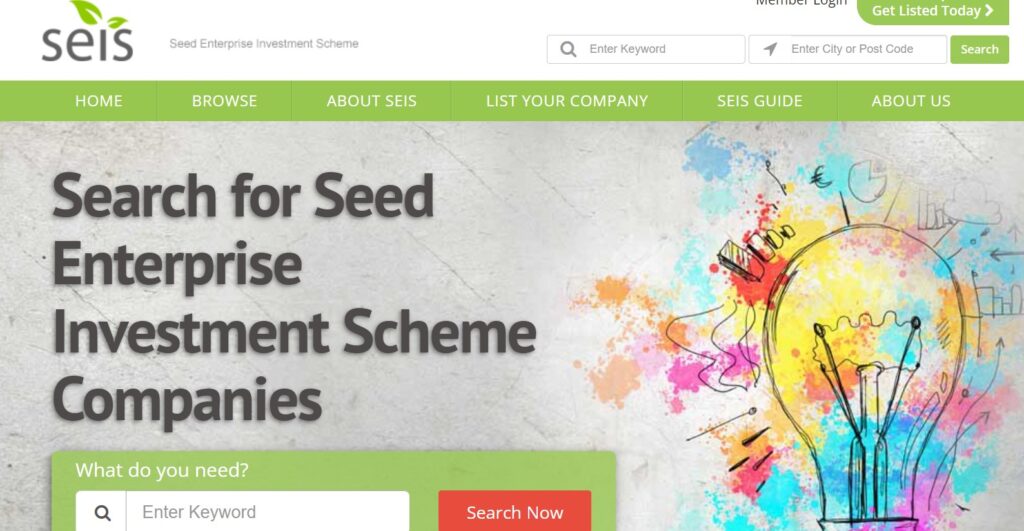
9. New Enterprise Allowance (NEA)
Features:
- Loan Amount: Varies; includes a weekly allowance plus a possible loan.
- Purpose: Supports individuals on benefits to start their own business.
- Support: Includes business mentoring, a weekly allowance, and possible loan funding.
Application Process:
- Initial Eligibility Check: Contact your Jobcentre Plus to check eligibility.
- Mentor Assignment: You are paired with a business mentor to develop a business plan.
- Plan Approval: Submit your business plan for approval.
- Funding and Allowance: Receive a weekly allowance and, if needed, apply for a loan to cover startup costs.
Limitations:
- Eligibility: Only available to individuals receiving certain benefits.
- Loan Cap: Loan amounts are limited and may not cover all startup costs.
Pros:
- Provides financial support and mentoring to help transition from unemployment to entrepreneurship.
- Offers a combination of a weekly allowance and loan funding.
Cons:
- Restricted to those on benefits.
- Limited financial support may require additional funding sources.
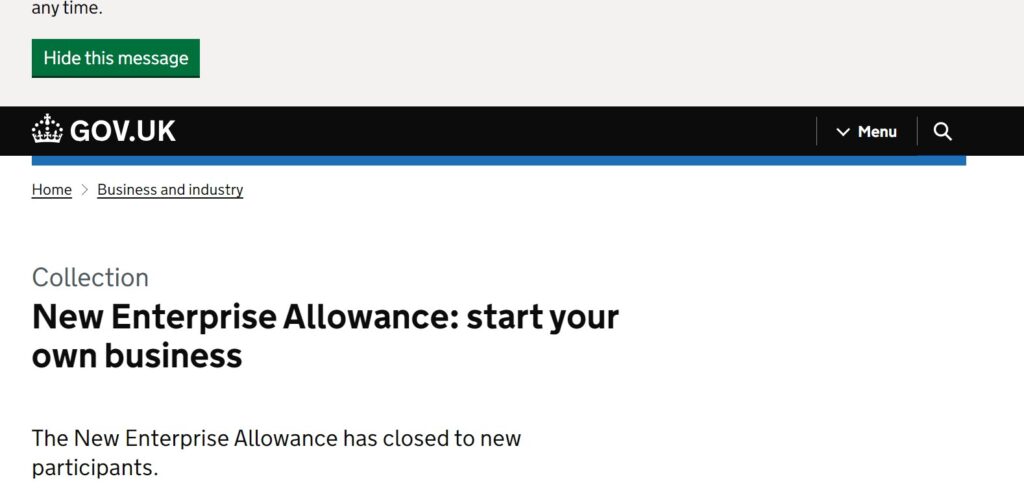
10. Local Enterprise Partnerships (LEPs)
Features:
- Loan Amount: Varies depending on the LEP and region.
- Purpose: Supports regional economic growth by providing funding to startups aligned with local economic priorities.
- Support: Includes financial support, business advice, and networking opportunities.
Application Process:
- Contact Local LEP: Reach out to your local LEP to discuss available funding opportunities.
- Project Proposal: Submit a detailed proposal outlining how your business supports regional economic goals.
- Funding and Support: If approved, receive funding and access to additional LEP support services.
Limitations:
- Region Specific: Only available to businesses operating within specific regions.
- Availability: Funding availability varies by region and may be limited.
Pros:
- Tailored support for regional economic development.
- Access to a network of local business leaders and resources.
Cons:
- Limited to specific regions.
- Funding amounts and availability vary widely.

How to Qualify for a Government Interest-Free Loan?
Key Eligibility Criteria
While each loan program has its own specific criteria, there are some common eligibility requirements that you’ll need to meet:
- Business Plan: A comprehensive business plan is often required, demonstrating your startup’s viability and growth potential.
- UK Residency: Most programs require that you and your business be based in the UK.
- Credit Check: Although interest-free, many loans will still involve a credit check to assess your ability to repay the loan.
- Sector-Specific Criteria: Some loans are only available to businesses in certain sectors or regions.
Tips for a Successful Application
- Prepare Thorough Documentation: Ensure all your documents, including your business plan and financial forecasts, are up-to-date and accurate.
- Understand the Criteria: Carefully read the eligibility requirements for each loan to ensure your business qualifies.
- Seek Professional Advice: Consider consulting with a business advisor or mentor to strengthen your application.
Comparing Government Interest-Free Loans: Which Is Right for Your Startup?
Considerations for Choosing the Right Loan
When selecting the right loan for your startup, consider the following factors:
- Loan Amount: Determine how much funding you need and match it with the loan that offers a suitable amount.
- Repayment Terms: Check the repayment period and terms to ensure they align with your business’s cash flow.
- Additional Support: Some loans offer mentoring or business advice, which can be just as valuable as the financial support.
Loan Comparison Table
| Loan Scheme | Maximum Loan Amount | Eligibility | Repayment Terms |
|---|---|---|---|
| Start Up Loans Scheme | £25,000 | UK startups, any sector | Up to 5 years |
| Prince’s Trust Enterprise Programme | £5,000 | Young entrepreneurs aged 18-30 | Up to 5 years |
| British Business Bank | Varies | High-growth potential startups | Varies based on loan type |
| Innovate UK Smart Grants | Project dependent | Innovative projects | Varies depending on project needs |
| Regional Growth Fund (RGF) | Varies | Region-specific startups | Region-dependent |
| National Lottery Heritage Fund | Varies | Heritage-related startups | Flexible terms |
| UK Export Finance (UKEF) | Varies | Export-oriented businesses | Based on export terms |
| Seed Enterprise Investment Scheme | Varies | Startups seeking equity finance | Dependent on investment terms |
| New Enterprise Allowance (NEA) | Varies | Individuals on benefits starting a business | Weekly allowance plus loan |
| Local Enterprise Partnerships (LEPs) | Region-dependent | Region-specific startups | Varies by LEP |
Conclusion
Government interest-free loans offer an invaluable lifeline for UK startups, providing essential funding without the burden of interest. By exploring the top 10 options discussed in this guide, you can find the right financial support to help your business thrive. Whether you’re just starting or looking to expand, these loans can provide the capital you need to achieve your business goals. Remember, the key to success is choosing the loan that best fits your startup’s unique needs and ensuring you’re well-prepared for the application process.
Frequently Asked Questions (FAQs)
Can I apply for multiple government interest-free loans?
Yes, it’s possible to apply for multiple government loans, provided your business meets the eligibility criteria for each. However, it’s important to consider the total debt you’re taking on and ensure that your business can manage repayments across multiple loans.
What happens if I default on a government interest-free loan?
Defaulting on a government loan can have serious consequences, including damage to your credit rating and potential legal action. It’s crucial to ensure that you can meet the repayment terms before accepting a loan.
Are there any hidden fees in these loans?
Most government interest-free loans are transparent with no hidden fees. However, it’s always a good idea to read the fine print and clarify any potential costs with the loan provider before signing the agreement.
How long does it take to get approved?
Approval times vary depending on the loan program. Some loans, like the Start Up Loans Scheme, can take a few weeks, while others may have longer processing times due to additional requirements like business evaluations.







